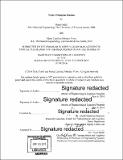| dc.contributor.advisor | Alexis Hickman Bateman. | en_US |
| dc.contributor.author | Gohil, Rishi | en_US |
| dc.contributor.author | Méndndez Vives, María Carolina. | |
| dc.contributor.other | Massachusetts Institute of Technology. Engineering Systems Division. | en_US |
| dc.date.accessioned | 2017-03-20T19:38:04Z | |
| dc.date.available | 2017-03-20T19:38:04Z | |
| dc.date.copyright | 2016 | en_US |
| dc.date.issued | 2016 | en_US |
| dc.identifier.uri | http://hdl.handle.net/1721.1/107518 | |
| dc.description | Thesis: M. Eng. in Logistics, Massachusetts Institute of Technology, Supply Chain Management Program, 2016. | en_US |
| dc.description | Cataloged from PDF version of thesis. | en_US |
| dc.description | Includes bibliographical references (pages 62-64). | en_US |
| dc.description.abstract | Unilever, a large multi-national Consumer Packaged Goods (CPG) company, uses water as an essential ingredient in its products and as a critical component in its manufacturing processes. In many instances, the price of water does not reflect market dynamics insofar as water is cheaper where there is low availability and vice versa. Business continuity costs due to poor water quality or water shortages may far outweigh the direct costs that Unilever incurs in purchasing water. Hence, by performing a literature review, numerous interviews with experts and stakeholders and an extensive review of existing water valuation tools, we created a framework that is capable of calculating a comprehensive value of water for any of Unilever's 250+ manufacturing sites based on site-specific conditions. We identified and developed the three core components of our framework, namely: purchase price, processing and handling cost and business disruption cost. Our main contribution is the estimation of a business disruption cost that takes into consideration mitigation options available and a scenario analysis of different water-related events to yield the total value-at-risk. A risk- adjusted value of water would enable Unilever to optimize water use and build resilience within its manufacturing operations by incentivizing water efficiency and catchment-based water stewardship initiatives where they are needed most. As the evaluation of a comprehensive price of water is a complex challenge, this project is a first step towards building a more robust framework. We have listed several recommendations that would strengthen the framework. | en_US |
| dc.description.statementofresponsibility | by Rishi Gohil and María Carolina Méndndez Vives. | en_US |
| dc.format.extent | 84 pages | en_US |
| dc.language.iso | eng | en_US |
| dc.publisher | Massachusetts Institute of Technology | en_US |
| dc.rights | MIT theses may be protected by copyright. Please reuse MIT thesis content according to the MIT Libraries Permissions Policy, which is available through the URL provided. | en_US |
| dc.rights.uri | http://dspace.mit.edu/handle/1721.1/7582 | en_US |
| dc.subject | Méndndez Vives, María Carolina. | en_US |
| dc.subject | Supply Chain Management Program. | en_US |
| dc.subject | Engineering Systems Division. | en_US |
| dc.title | Water : pricing the priceless | en_US |
| dc.title.alternative | Pricing the priceless | en_US |
| dc.type | Thesis | en_US |
| dc.description.degree | M. Eng. in Logistics | en_US |
| dc.contributor.department | Massachusetts Institute of Technology. Supply Chain Management Program | |
| dc.identifier.oclc | 962736137 | en_US |
